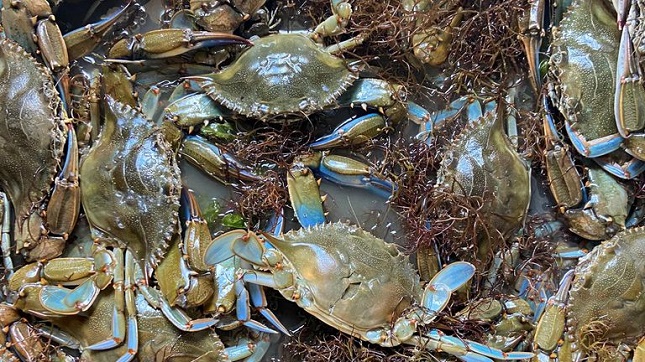
Italy to spend €2.9m to tackle invasion of aggressive blue crabs
The species, originally from the western Atlantic, has spread across several lagoon-like locations in Italy, preying on local shellfish, fish roe and other aquatic life. A marine biologist says the crabs have eaten up to 90% of young clams. There could be a link to climate change.
Advertisement
Italy has said it will spend €2.9m (£2.5m) to tackle an invasion of aggressive crabs that is threatening the country's role as one of the top producers of clams in the world - and potentially one of its signature pasta dishes.
The blue crab, originally from the western Atlantic, has spread across several lagoon-like locations in Italy, preying on local shellfish, fish roe and other aquatic life.
Clam aquafarms in the delta of the Po river valley in northern Italy have been hit particularly hard, with a local marine biologist telling Reuters last week the crabs had eaten up to 90% of young clams, almost wiping out future production.
Experts have said it is unclear why the crabs are now reproducing with such speed but there could be a link to climate change.
Italy's agriculture minister, Francesco Lollobrigida, visited the delta on the Po river on Saturday and said the government would approve the emergency funding.
The €2.9m will be given to fishing cooperatives and aquafarmers trying to curb blue crab numbers with a large-scale fishing campaign, Reuters reported.
Fishermen in affected areas have been advised to catch as many blue crabs as possible to cull their numbers.
Crab invasion 'could be linked to climate change'
Last week Emanuele Rossetti, from the Fishermen's Cooperative of the Polesine, part of the Po delta valley, told Reuters as much as 12 tonnes worth of crab was being caught every day but with little impact on the crab population.
Italy is Europe's biggest producer of clams and the third largest in the world behind China and South Korea, according to UN Food and Agriculture Organisation data from 2021.
The influx of crabs could put the classic Italian dish - spaghetti alle vongole (spaghetti with clams) - at risk.
Sasa Raicevich, a marine aquatic resources expert from the Italian Institute for Environmental Protection and Research
(ISPRA), said blue crabs are thought to have arrived in Italy via shipping bilge water.
He said they were first detected about a decade ago, and it is still unclear why they are now multiplying with such speed, adding: "There could be a link to climate change, but we have no evidence to say it for sure."
He said the situation was very serious in terms of ecological and economic damage and warned there was no possibility of completely eradicating the blue crabs.
"We have to contain them and find ways of coexistence... it's going to be difficult," he added.




